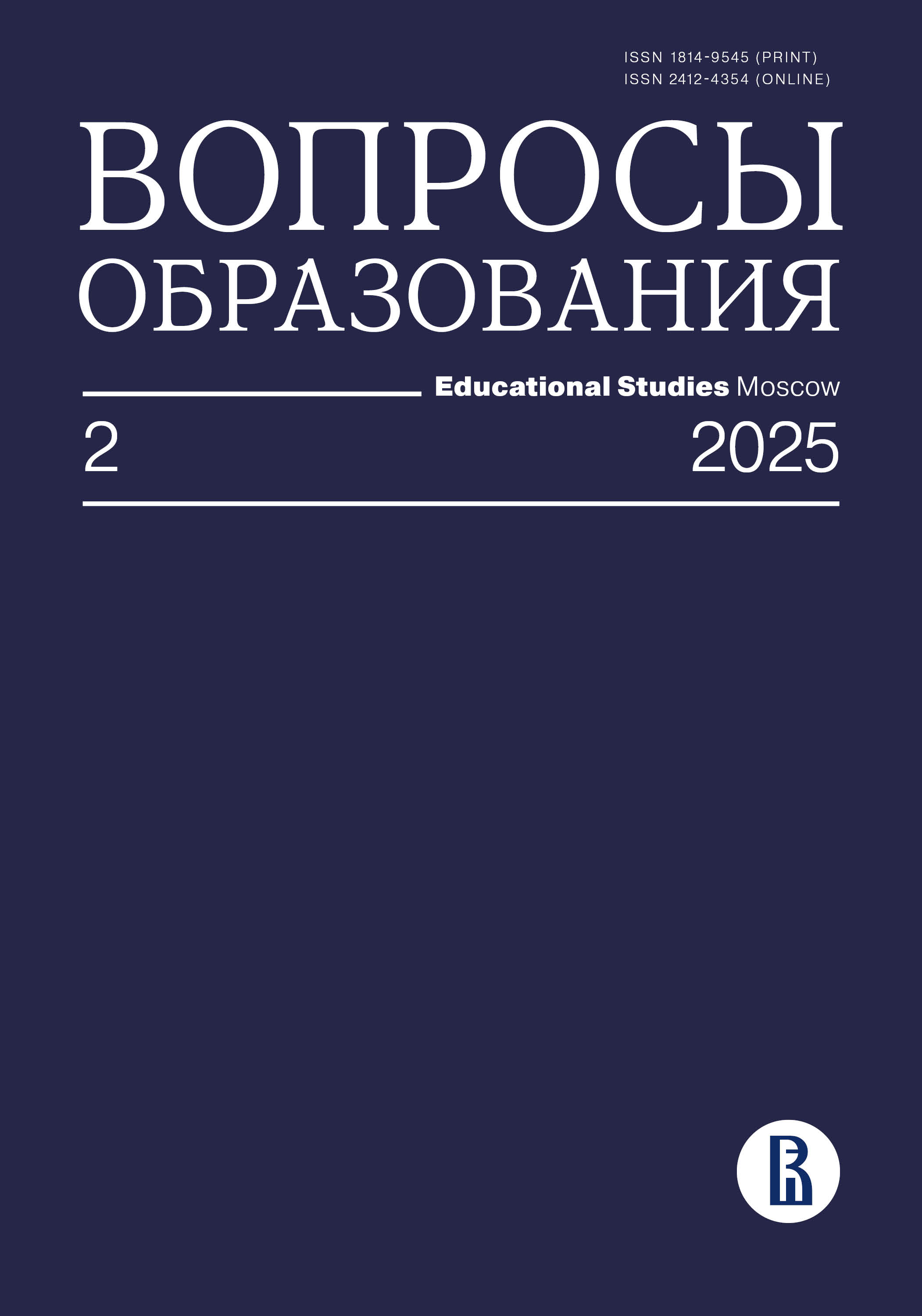Foreign Language Learning Practices by High School Seniors in the Context of Modernization of Foreign Language School Education (2020–2024)
Abstract
The purpose of the article is to analyze informal additional foreign language learning practices used by high school seniors in the context of modernization of school foreign language education, primarily expressed in optimizing the requirements for the formation of a multilingual component and the loss of the status of a compulsory subject in a second foreign language. The research strategy involves a comparative analysis between two reference points: 2020 and 2024, using data from official statistics, such as the Federal State Statistics Service (Rosstat) and specifically conducted sociological research by the MSLU sociological laboratory in cooperation with the NAFI research company among students of grades 8-11 in the Moscow region and other regions of the Russian Federation. Additionally, the study focuses on the informal (extracurricular) learning practices of seniors for foreign languages. The obtained results indicate an increase in the proportion of English language learners with a simultaneous loss of the role and importance of the traditional German and French languages for Russian foreign language education, as well as a reduction in the study of other foreign languages. The ongoing public discussions about the reorientation of the foreign component of school education in accordance with the new geopolitical situation to the languages of Asia and Africa do not have any real opportunities for their implementation due to the lack of staff and logistical support. At the same time, the maintenance of the elite segment of foreign language education in the form of specialized educational institutions with in-depth study of foreign languages is fixed, which does not eliminate, but rather perpetuates the gap in unequal access to opportunities for obtaining foreign language competencies and career opportunities. Additional (extracurricular) foreign language classes, including paid ones, continue to be in demand among seniors. The degree of involvement of schoolchildren in additional educational practices is determined by regional, settlement and professionally oriented factors.
Downloads
References
Arefiev A.L. (2020) Trends in Studying the French Language in Russia. Media al'manakh, no 6, pp. 230–261 (In Russian). https://doi.org/10.30547/mediaalmanah.6.2020.230261
Bialystok E. (2001) Bilingualism in Development: Language, Literacy, and Cognition. New York, NY: Cambridge University. https://doi.org/10.1017/CBO9780511605963
Dakukina T.A. (2021) Problems of a Second Foreign Language Teaching in a Comprehensive School. MCU Journal of Pedagogy and Psychology, no 1(55), pp. 100–112 (In Russian). https://doi.org/10.25688/2076-9121.2021.55.1.08
Durgunoglu A.Yu., Goldenberg C. (eds) (2011) Dual Language Learners: The Development and Assessment of Oral and Written Language. New York, NY: Guilford.
Galinskaya T.N., Roshchupkina E.I. (2021) Vocational Guidance Potential of the Second Foreign Language in the School. Problems of Modern Pedagogical Education, no 71-1, pp. 97–100 (In Russian).
Gotlib R.A. (2015) Language Education in Russia in the Period of Political Instability. Vlast, no 1, pp. 95–99 (In Russian).
Gotlib R.A. (2009) Social Meaning of Foreign Language Knowledge. Sotsiologicheskie issledovaniya / Sociological Studies, no 2(298), pp. 122–127 (In Russian).
Gulyaeva V.S., Mingalieva V.R. (2015) Introduction of Compulsory Learning of a Second Foreign Language at School: Fashion or Norm? Improving the Teaching of Foreign Languages at School and University: Collection of Scientific and Methodological Works (ed. S.S. Kuklina), Kirov: Raduga-press, iss. 18, pp. 15–20 (In Russian).
Humboldt V. (2000) On the Comparative Study of Languages in Relation to Different Epochs of Development. Humboldt V. Selected Works on Linguistics. Moscow: Progress (In Russian).
Mertsalova T.A., Kosaretsky S.G., Anchikov K.M. et al. (2022) School Education in the Context of National Goals and Priority Projects: Analytical Report. Moscow: HSE (In Russian). https://doi.org/10.17323/978-5-7598-2693-4
Morales J., Calvo A., Bialystok E. (2013) Working Memory Development in Monolingual and Bilingual Children. Journal of Experimental Child Psychology, no 114, pp. 187–202. https://doi.org/10.1016/j.jecp.2012.09.002
Obraztsov I.V., Polovnev A.V. (2022) Schoolchildren’s Involvement in Additional Education and Foreign Language Classes. Sotsiologicheskie issledovaniya / Sociological Studies, no 6, pp. 101–113 (In Russian) https://doi.org/10.31857/S013216250016400-3
Osipov G.V., Arefiev A.L. (2020) Sociology of Language. National and Foreign Languages in the Education System. Moscow: Yurayt (In Russian).
Pinchuk A.N. (2016) Educational Practices in the Conceptual Field of Sociology. Znanie. Ponimanie. Umenija / Knowledge. Understanding. Skill, no 4, pp. 322–330 (In Russian). https://doi.org/10.17805/ zpu.2016.4.29
Primakov V.L. (2021) Linguistic Educational Inequality: Problem Statement and Analysis of Consequences. Vestnik Moskovskogo gosudarstvennogo lingvističeskogo universiteta. Obŝestvennye nauki, no 2(843), pp. 326–345 (In Russian). https://doi.org/10.52070/2500-347X_2021_2_843_326
Ryabova E.M. (2010) Multilingualism as Overcoming the Complexity of the World. Voprosy filosofii, no 7, pp. 149–152 (In Russian).
Scriabina A.A., Svetlik M.V., Bushov Yu.V. (2024) The Influence of Bilingualism on the Individual Psychological Characteristics of Students]. Psychophysiology News, no 3, pp. 120–123. (In Russian). https:// doi - 10.34985/g7044-6155-3991-v
Shaigerova L.A., Shilko R.S., Zinchenko Yu.P. (2019) Bilingualism and Multilingualism as an Interdisciplinary Phenomenon: Sociocultural Context, Problems and Prospects of Research. National Psychological Journal, no 1 (33), pp. 3–15 (In Russian). https:// doi: 10.11621/npj.2019.0101
Smirnova Yu.A. (2024) Social Portrait of a Foreign Language Teacher in the Context of Changing School Education. Vestnik Moskovskogo gosudarstvennogo lingvističeskogo universiteta. Obŝestvennye nauki, no № 3(856), pp.128–136 (In Russian).
Smirnova Yu.A. (2022) School Teachers-Semiprecaries: Typology on the Example of Linguist Teachers. Vestnik Moskovskogo gosudarstvennogo lingvističeskogo universiteta. Obŝestvennye nauki, no 1(846), pp. 136–143 (In Russian). https://doi.org/10.52070/2500-347X_2022_1_846_136
Solovyeva A.M. (2024) Bilingualism as a Problem of Psycholinguistics and Linguistics. Pedagogical Education, vol. 5, no 1, pp. 178–186 (In Russian).
Strelnikova A.V. (2009) Social Actions. Thesaurus of Sociology: Thematic Dictionary-Reference Book (ed. Zh.T. Toshchenko), Moscow: UNITY-DANA, pp.176–180 (In Russian).
Tsalikova I.K., Pakhotina S.V. (2021) The Issue of Motivation for Foreign Languages Learning in International Research Works: Scoping Review. The Education and Science Journal, no 5, pp. 38–63 (In Russian) https://doi.org/10.17853/1994-5639-2021-5-38-63
Volkov V.V., Kharkhordin O.V. (2008) Theory of Practices. St. Petersburg: Publishing House of the European University in St. Petersburg (In Russian).









